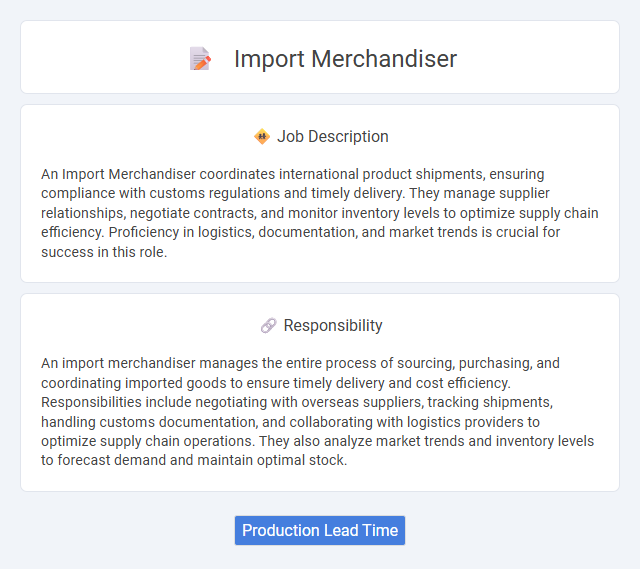
An Import Merchandiser coordinates international product shipments, ensuring compliance with customs regulations and timely delivery. They manage supplier relationships, negotiate contracts, and monitor inventory levels to optimize supply chain efficiency. Proficiency in logistics, documentation, and market trends is crucial for success in this role.
Individuals with strong organizational skills and attention to detail are likely suitable for an import merchandiser role, as the job involves managing complex logistics and coordinating with international suppliers. Those who thrive under pressure and possess good communication abilities probably find this position fitting, given the need to resolve shipment issues and negotiate with vendors. People lacking patience or struggling with multitasking may find this job challenging due to the fast-paced and detail-oriented environment.
Qualification
An import merchandiser must possess strong knowledge of international trade regulations, customs documentation, and supply chain logistics to efficiently manage the import process. Proficiency in vendor coordination, negotiation skills, and fluency in import-export software or ERP systems is essential for optimizing shipment schedules and cost control. A background in business administration, logistics, or supply chain management along with excellent communication and problem-solving abilities enhances their capability to handle complex import operations.
Responsibility
An import merchandiser manages the entire process of sourcing, purchasing, and coordinating imported goods to ensure timely delivery and cost efficiency. Responsibilities include negotiating with overseas suppliers, tracking shipments, handling customs documentation, and collaborating with logistics providers to optimize supply chain operations. They also analyze market trends and inventory levels to forecast demand and maintain optimal stock.
Benefit
An import merchandiser likely enhances supply chain efficiency by coordinating shipments and managing customs documentation, which can result in cost savings for the company. This role probably improves inventory accuracy and reduces lead times, contributing to better product availability. Professionals in this position may also gain valuable experience in international trade regulations and negotiation skills, boosting career growth potential.
Challenge
Import merchandisers likely face the challenge of navigating complex international regulations and customs procedures, which can cause delays and increase costs. Managing supplier relationships across different time zones and cultural differences may also complicate coordination and communication. The probability of encountering unexpected logistical issues requires quick problem-solving skills and adaptability to maintain smooth import operations.
Career Advancement
Import merchandisers manage international supply chains, negotiate with global suppliers, and oversee product quality to ensure timely delivery. Mastery of logistics, customs regulations, and vendor relationships enhances opportunities for progression into senior roles such as Supply Chain Manager or Global Sourcing Director. Developing expertise in data analysis and risk management further accelerates career growth within multinational companies.
Key Terms
Production Lead Time
An Import Merchandiser plays a critical role in managing Production Lead Time by coordinating timelines between suppliers, manufacturers, and logistics teams to ensure on-time delivery. Efficient management of production schedules, order processing, and shipment arrangements minimizes delays and optimizes supply chain flow. Monitoring lead times closely helps mitigate risks of inventory shortages and supports seamless market demand fulfillment.
 kuljobs.com
kuljobs.com